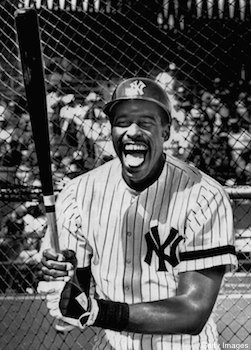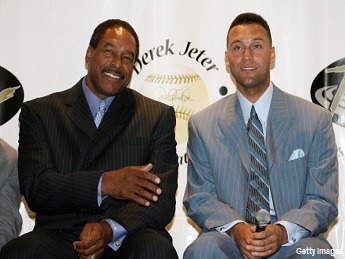Hall of Famer Dave Winfield is working with the Capital One Cup, a competition that honors the top Division I athletic programs each year. Playing for Minnesota, Winfield was the College World MVP in 1973. He tallied 3,110 hits and 465 home runs in his 23-year MLB career. He was also one of the first athletes to start his own foundation. ThePostGame caught up with Winfield for his thoughts on baseball, a Yankee prospect with similar skills to his and more.
ThePostGame: Why don't you tell a little bit about what you're doing with Capital One Cup?
DAVE WINFIELD: Well, as a former college athlete, Capital One was looking for a representative that could talk about their program called the Capital One Cup. This is the fifth year of existence and they're really recognizing and honoring Division I athletic programs for their success on the field. They support athletic and academic pursuits. It's a great relationship that we’ve established, and I'm letting people know about it. At the end of the year, during each year, they compile points for winning programs. If you're a national champion you get 60 points. If you're 1 through 10 you get a certain amount of points. At the end of the spring programs, you add them up and the winning men's program will get $200,000 and the women’s will do the same. Right now, we're at the College World Series and the two men's teams that are close to achieving this status: Ohio State is No. 1 because of the football championship and the wrestling, but Virginia is right on their heels and they have a very good chance of overtaking them at the end. On the women's side, Stanford is in the lead and Florida has a chance to overtake them because of the track and field championships. When it's all over, there’s a trophy and there’s the money for the program and they get honored at the ESPY’s in July.
TPG: What memories do you have from playing with Minnesota in the College World Series?
WINFIELD: The whole experience is branded in my mind. It was actually the last time that Minnesota, a northern team, had been to the World Series. They were champions, could you believe, in 1960 and 1964. So in 1973 it wasn't so far off. We lost to the two teams that went for the championship. USC was the ultimate champion and Arizona State came in second. We lost to those two teams. The last one I'll always remember. My last game in college I was pitching a one-hitter going into the ninth. We're up 7-0. When relief came into pitch, we gave up the lead and lost 8-7 and that was it. It was heartbreaking but it was still a memorable experience for all involved and all the guys on the team will remain friends, people I love and respect. That's what I remember. I went as hard as I could and as long as I could and then my next step, a week later, I signed with the San Diego Padres and off to the next level of my career.

TPG: You were drafted by teams in three different sports. How was that process for you, garnering attention from all of these teams?
WINFIELD: It was a very good thing. The Vikings kind of came out the blue, but they saw me up close and they said, 'The guy is big, strong, good hands, can run. Maybe he'd like to be tight end for Fran Tarkenton and the Purple People Eaters.' It was a wonderful honor, but I'll leave that to someone else. In basketball, I knew I'd get drafted. We had five guys off our Minnesota team get drafted. We had a good team. Baseball, I knew I'd get drafted, so to look back, I don't know if anyone has been drafted in three sports since. I don't know if I'd recommend all that it took to be in a position to be drafted like that. In fact, nowadays, parents start funneling their kids into one sport when they're 8 or 9 years old and that's no good. Let the kid play all kinds of sports to see what they’re good at, what they like and not burn them out. That's kind of what happened to me and I just had a wonderful opportunity.
TPG: And you knew baseball was where you wanted to go right away?
WINFIELD: It was, but you can't say that when you're negotiating. I said, 'If you don't let me go to the major leagues when you draft me, I'm going to go play basketball.' That’s how that played out. Basketball is the secondary sport, but I love it. I watch the playoffs, know all the guys, hang out with them. Football was more of a spectator sport. I'll leave that to someone else.
TPG: One of the goals that you had was to start a foundation. This was something a little unprecedented for athletes back then, so can you go through the process of starting your foundation?
WINFIELD: You have to think, in 1973 athletes weren't the multi-millionaire types of people that you see today. I was very grateful and thankful that people supported me all the way up to the professional level, so the first thing I did was give $1,000 out of bonus, which wasn't that much money back then, for a scholarship program in my home of St. Paul, Minnesota. Last weekend, we had the 39th annual scholarship dinner in St. Paul, so I'm very happy about that. It's still in operation. My foundation was a more complex, more sophisticated, multi-city approach to giving back. I did that for 22 years and then I said now my foundation has to be my kids, and to take care of them. It’s something that you have to be committed to and I was because I appreciated people helping me be successful. There’s some steps you must follow, with paperwork and meetings and all that stuff. But if you’re committed, that’s the way to go.

TPG: Are you happy to see the philanthropy in sports now, with many athletes starting foundations?
WINFIELD: Definitely. Their agent probably instructed them that this was a good way to endear yourself to a community and if you’re committed, these are the steps to take. I’m glad they’re doing it. They’re successful in life, so to give back, to be thankful, to be gracious like that, it’s a good thing. It’s a big component in being a good person, so I’m glad to see some many people doing. When I started doing it, I had no clue that it would catch on and that this would be something they’re instructed to do. You plant a seed and you see it flourish.
TPG: I hear you're a big fan of Giancarlo Stanton. What do you like about him?
WINFIELD: He’s from Los Angeles and he lives out here and I got the chance to meet him before he became the big star that he is, the highest paid player in the game. I just appreciate a big man being able to perform at a high level. Baseball is an intricate sport. The compact guys usually have an advantage, but when I see a big guy that can perform, that can run, that can field, that can throw. He’s one of the many that I appreciate. There’s so many good guys in the game. I see Mike Trout play a lot. I see Clayton Kershaw. I can look around the league. I see good guys that give back. Robinson Cano does a lot of good things. Derek Jeter, who I’ve known for many years, he’s the icon of the game. He's gone now, but others will take his place. I’m just very happy to be close to the game and get to know these guys very well.
TPG: What did you think of Derek Jeter's final season and the fanfare that went with it?
WINFIELD: How do you say it? He had a fairy-tale career. It's like you couldn't script it. How do you come through in the clutch all the time? How are you on a winning team so often? And I don't say this out of envy of jealousy of being upset' there's no one holding grudges against Derek. How do you play in New York for 20 years and escape unscathed? Unprecedented. He had a heck of a career and he’s entitled to do whatever he wants in life now and he’s enjoying himself.

TPG: I hear there's a prospect getting a few comparisons to you. Have you heard about Aaron Judge at all?
WINFIELD: Oh yeah. I got a chance to meet him during spring training. With the Players' Association, we go see every ball club and meet every person and tell them their rights and what they must do in the workplace. I said, 'Who's this Aaron Judge?' You think I’m a big guy; he's Paul Bunyan. He's like 6 foot, 8 inches, but stealth, strong and smooth in the outfield. I haven't seen him play, but a lot of people say he’s a young Dave Winfield. He’s another young guy that I’m going to follow. Aaron Judge.
TPG: I'm going to try to get some predictions out of you now. Do you have a favorite for the College World Series?
WINFIELD: No, I don't have a favorite. I respect all these teams being there. I know the coach at Virginia. I’ve spoken at this school before and they have a great fundraiser and program. I could look at Fullerton, a California team. I can’t say flip a coin because there’s eight teams, but just let the best team win and have some fun guys.
TPG: The same goes for the MLB season. Do you have any teams that you like so far?
WINFIELD: Being in California, I watch teams like the Dodgers. I think the Padres are going to put up a strong effort before the season is over. They've come a long way. Again, I try not to have as many favorites. Working with the Players’ Association, I see all the guys and all of the teams and I just wish them well and hope that they’re healthy and play a long time and take care of business. No real favorites anymore.





